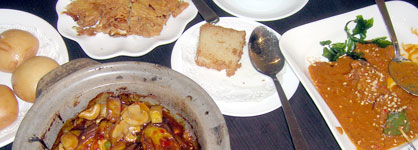Vegan and Vegetarian Chinese Food in SE Asia
Manage episode 155930273 series 1171191
Throughout Southeast Asia, Chinese Buddhist vegetarians kept Bill very well fed. He finds out more about this other vegetarian movement – and tries lots of food.
http://www.archive.org/download/VeganAndVegetarianChineseRestaurants/seasiajourney_chinese_v1.0_vbr.mp3 Download internet radio report (5 mins 02 secs): Travelling and Eating Vegan in Southeast Asia: Chinese Restaurants (MP3 3.64MB) (other sound file formats)
Download internet radio report (5 mins 02 secs): Travelling and Eating Vegan in Southeast Asia: Chinese Restaurants (MP3 3.64MB) (other sound file formats)
This is the final of three reports from Bill’s travels. Please follow these podcasts and blogs for more reports; or enjoy an episode of The Vegan Option about this Southeast Asian trip.
Bill on Chinese Vegetarians
From Singapore to Thailand, I ate plenty of Chinese food. In both the trading areas which face Sumatra across the Melaka Straits, and in the big cities like Kuala Lumpur and Bangkok, there were so many vegan or almost-vegan restaurants that I sometimes stumbled across them without having to seek them out. Until I got to veggie-friendly Chiang Mai at the northern tip of my journey, they were all run by the Buddhist Chinese.
As a bonus, they often took local speciality dishes and veganised them, giving me a culinary journey.
Curious about what motivated this, I talked to the managers and chefs.
This contrasts a little with Thai Buddhism. This has a tradition that every man should become a Buddhist monk at least once in their life, so I had plenty of chances to talk to former monks as well as monks currently wearing the orange robes of Thai monks. They told me that they do eat meat placed in their begging bowl, and that they believed this tradition was what based in what the Buddha did. So where did the idea of vegetarianism come from? I visited Dr Peter Flügel, a lecturer in Jaina studies in London’s School of Oriental Studies, to get his answer.
To hear more, I hope you will listen to the report.
But is Chinese mock meat really vegan? Operation Pancake
Meanwhile in Los Angeles, the Quarrygirl vegan foodie blog had been doing an undercover investigation of supposedly vegan restaurants. They tracked fake meats that tested positive for egg and milk back to suppliers in Taiwan. Contaminated vegan food has become a big enough issue there for ministers to try to strengthen and enforce labelling laws.
This is an international problem, affecting Chinese food from Taiwan to the USA. But how much does it affect the Chinese food travellers eat in Southeast Asia? I asked the International Vegetarian Union co-ordinator for the whole of Southeast Asia, Susianto Tseng.
“Yes, the Chinese vegetarian restaurants in Indonesia also purchase some mock meats from Taiwan, but most of them are purchased from Malaysia’s and Singapore’s manufacturers. We have heard about the contamination of mock meat made in Taiwan so that IVS [Indonesia Vegetarian Society] informs the vegetarian in Indonesia to be careful and aware of that.”
So there is a possibility that the meal will not actually be vegan. But this is always going to be a risk, and both the level of contamination and the risk seem low in the context of other SE Asian restaurants.
I was very glad that the Chinese diaspora were there to feed me in my travels.
See also …
- Hail, Seitan by Caitanya Bhagavat Das of the Hare Krishna movement in Utah, USA
- Ting Jen’s legendary history of China and vegetarianism on the IVU website, with a letter from a missionary in 1889.
- Buddhist Cuisine on Wikipedia
- List of vegetarian restaurants run by followers of Supreme Master Ching Hai, a modern asian religious organisation with a vegetarian leaning
My thanks go to Dr Peter Flügel of SOAS, University of London, to Chong Keng Hoon from Luk Yea Yan in Penang, to Jack from Whole Earth restaurant in Singapore, and to the kin who ate all the mock meat whilst I interviewed Jack.
![]() If you enjoyed this podcast, you can easily subscribe to future Verdant Reports podcasts here.
If you enjoyed this podcast, you can easily subscribe to future Verdant Reports podcasts here.
4 حلقات






